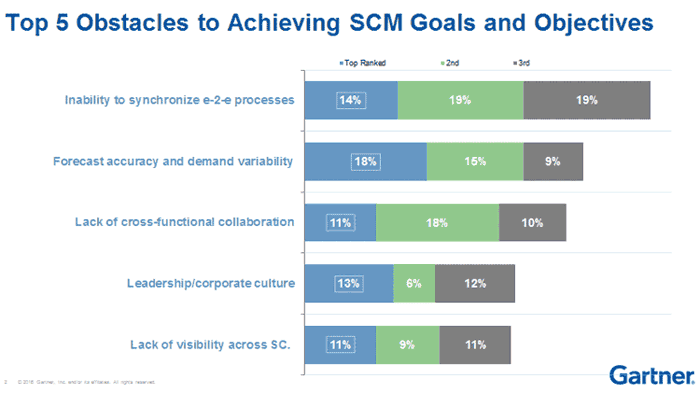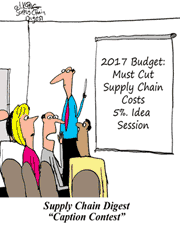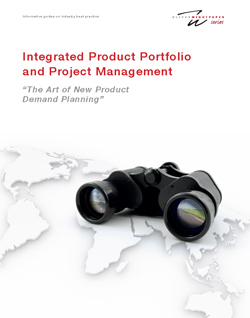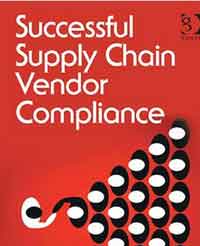 |
January 5, 2017 - Supply Chain Flagship Newsletter |
 |
| FEATURED SPONSOR: 10TH ANNUAL GARTNER SURVEY |
|||
Last Chance! 10th Annual Gartner-SCDigest Supply Chain Study!
|
|||
As Always, Survey Respondents Receive Complimentary |
|||
 |
|
||||||||||||||||||||||||||||||||||||||||||||||||||||||||||||||||||||||||||||||||||||||
In November, I suggested the supply chain likely will be affected in multiple areas from a Trump administration: successful shaming of companies offshoring production/jobs (already of course happening); pull back of environmental mandates and greater push for US energy development, with possible adjustment to the never legally binding 2015 UN Paris climate accord; significant change over time to the aggressively pro-labor National Labor Relations board seen under Obama; and possible heavy tariffs on some imported goods (which now looks like it may take the form of an unusual thing called a border adjustment tax).
Of course, many of the robots are being deployed in the supply chain, and IDC predicted in November we will soon see the rise of the Chief Robotics Officer at companies. Continued Growth of eCommerce and the Impact on Brick and Mortar:
|
|||||||||||||||||||||||||||||||||||||||||||||||||||||||||||||||||||||||||||||||||||||||
|
|||||||||||||||||||||||||||||||||||||||||||||||||||||||||||||||||||||||||||||||||||||||
|
|||||||||||||||||||||||||||||||||||||||||||||||||||||||||||||||||||||||||||||||||||||||
|
|
|
YOUR FEEDBACK
Lots of Feedback from Dan Gilmore's First Thoughts column on The Trump Supply Chain?, with his analysis of what we can likely expect in terms of supply chain impact from the Trumpster. A few of those below, more in coming weeks. There were quite a few.
Feedback on The Trump Supply Chain:
![]()
I'm an Ohio guy too. (Dayton). I grew up in Michigan as one of six kids of a Chrysler engineer, and a school teacher. I graduated from college in 1975, and began my sales career in industrial safety equipment with a company that had been in business since 1883.
Several things have happened since I was a teenager north of Detroit. The 'Big Three' auto manufacturers poo hooed the import invasion. Saying import quality was not as good. Oil prices were not a concern. That changed with the oil shortages of the 70's, and increasing quality of imported products.
On the labor front, people forget that during the forties and fifties, union and management clashes were frequent. And, gains won by unions were extended the salaried workers as well. My Dad knew that if it wasn't for the union wins, salaried and employees at non-union companies, would not have things like company retirement plans, health insurance, paid vacation, and 40 hour work weeks. After winning a big auto company contract (early 80's), my boss and I were invited to tour a Midwest plant. A VP from the company gave us the grand tour. He was sure to point out the efficiency of their new robots. And, the fact that they didn't have to pay benefits or healthcare, cool and heat the plant as much, and didn't have to worry about employee (aka union) grievances. When he finished, my boss said, "That's great. But tell me, how many of those robots are going to buy the cars they just built?"
Over the last thirty years, companies have based all of their decisions on increasing shareholder value. As the global market grows, Companies like P&G and Emerson Electric expand overseas for a variety of reasons. Cheap labor; lax, or nonexistent safety and environmental regulation; ability to sell in the company they manufacturer without import tariffs; and close proximity to a population of billions with a growing middle class demand.
But I digress. I sold safety equipment in the Midwest for one of the top three manufacturers in the country. I had contracts with everyone. AK Steel, P&G, GE, Ford, GM, Chrysler, NCR, IH, Honda, and yes, the tire companies too. As they moved overseas, or moved to robotics, the market for personal safety equipment tanked. So, being in the birthplace of barcoding, and having a bit of experience with the fledgling PC industry, I switched to the barcode industry.
My contacts with the big manufacturers made it easy to transition. I sold to all of the GM plants in Dayton, NCR, Reynolds & Reynolds, Standard Register, Emerson, P&G, NCR, AK Steel, Mead, and on, and on. As you know, in the beginning of the industry, companies and their workers had to be educated on the technology. When I would do an automation project for a company and be dealing with the rank and file shop floor, or DC employees, the company line was, "This will make your jobs a lot easier, and make you more efficient". However, behind closed doors with management, a question that almost always came up was, "How many people do you think this will allow us to eliminate?" Again, the increase shareholder value mantra.
I sold to the mines in West Virginia, Kentucky, and Southern Indiana. Nothing Trump says, or does, is bringing those jobs back. Mining is now done with mega machines. (Mountain top mining). And, as long as natural gas is cheaper, there is no incentive to support coal. That would be like a politician saying they were going to bring back whale oil as an energy source when oil was discovered. (BTW - When I sold safety equipment, I also sold coal, jet fuel, gasoline, and diesel fuel. I also had relatives high up in the oil industry. If you want someone who really knows the score on energy, talk to Bernie Sanders)
Do you remember the Takata plant in Piqua? In the 80's, I was doing a small project with them. I was there on a Wednesday, and told the plant manager that I'd be back Friday with demo equipment to show them. He said that would be great. When I got there Friday morning, the plant had been closed, and all of the production had been moved to Mexico. The plant manager hadn't even known it was going to happen.
There is a plant that makes automotive parts on the West side of Dayton. (I can't remember the name). They were a safety and barcode customer of mine. They went from 480 employees, down to about 100. Production was moved to China. About four years ago, and Jon Boehner was interviewed by one of the local TV stations in the plant. The plant manager told the reporter that the only reason they weren't shut down completely, was because they were needed as emergency backup when Chinese quality, or shipment reliability failed. When Boehner was pressed for a comment on what he thought about it, he replied, "We don't want to make them mad."
Fuyao is a customer. Their locating to the U.S. is great news. All of the big press as a 'win' should be tempered by the fact that the vast majority of 'employees', are contract employees, and do not actually work for Fuyao. A former customer in Eaton, Neaton Auto Parts, hires entirely through Staffmark. DMax, (or Tenneco - I wasn't watching closely) was recently on the news touting their need for 400 employees. The person being interviewed said that these were good jobs, and the starting pay was eleven something an hour, and in three years, you could get up to over thirteen dollars. Really?
Foxconn has 10,000 applications a month. (I believe I may have that wrong, and it's actually per day). We are seeing the production environment of the late 1800's, and early 1900's repeat itself. When the government tells a manufacturer that they won't extend tax breaks to VW in Tennessee if they vote in a union, it's very clear where we're headed. Obama has done more to combat unfair trade than any President before him. Tariffs will further encourage companies to make, and sell, their products overseas. My former safety company now has no U.S. manufacturing, their industrial division is closed, and their retail products (rainwear, gloves, and boots) are now sold at Ace and Big Lots.
I even had a former Dayton customer you might know (Shore to Shore Merchandise Identification - since sold). Tried to buy Zebra printers from me when I worked for a master distributor. These were going to various overseas countries. Zebra told them that the only way could get service on them was to buy them where they were being installed. An international hospital chain that is a customer, buys scanners in England and ships them to their U.S. facilities, because they are sold at lower prices. U. S barcode equipment manufacturers routinely sell scanners in foreign countries at lower prices than the U.S.
Even Wal-Mart touts their 350 million dollar "Buy American" campaign. That's laughable. To the unsuspecting public, that's a great PR stunt. They think it's a lot of money. To Wal-Mart, it's the equivalent of loose change in their couch.
Bob McIntyre
National Account Executive
DBK Concepts, Inc.

![]()
Thank you for your great article "Trump Supply Chain". I am an industrial and supply chain engineer / consultant as well as an inventor and I have a dream/vision that I have been focused on since 2008. So I believe in what Trump has been discussing regarding manufacturing, trade, de-regulation, energy and beyond. One big reason is because I have worked with so many companies in supply chain consulting over the years and seen the changes and have been able to see what is going to happen in the future. Part of industrial engineering is forecasting. Also, when you are responsible for supply chain strategy for companies and looking out 5, 10, 15 years you have to know the past, understand the details and the model the future.
As an inventor, I have experienced the Chinese trade "cheating" personally. Also, I have seen the major changes in the last few years in USPTO laws that make it extremely difficult for innovation in America. This is not what America is about. Other countries do not try to keep minds from moving forward and producing products.
One of my certificates is in computer integrated manufacturing systems. My degrees are from Georgia Tech and back then we focused on high quality manufacturing in America. Times changed too quickly. I do believe with "right to work" states increasing and with more use of industrial engineering methods and standards along with major advancements in supply chain that manufacturing costs can be decreased enough to bring manufacturing back to USA and increase what is already here. Many existing manufacturing companies are using parts from China or other countries, where they could be made in USA.
For example, I am working on a big invention project and we want the entire invention (lots of products) to be made in America. However, a major component is a complex electronic circuit board and more. It is very hard to find a company in the USA that can create this high volume. This frustrates me given our great colleges across our country. I believe that in electronics you need EE's, managers and then workers that are trained. Of course you need the special equipment along with quality testing. The first company to start this at high volume would be a winner. Hmm, if this company decides to start the business in a empty manufacturing facility in a poverty stricken area where people need a job and need to be trained. Wow, that would be a winning company and a change in our country that would start a domino affect.
Also, it is about competition. We have so many people that need jobs. We have so many empty buildings in so many locations that are in prime locations from a logistics standpoint that help supply chain in multiple ways. Companies can collaborate in ways to lower costs. Well, which ones want to collaborate, which locations want to improve their environment to attract business. Who wants to work. The list can go on and on. I have a documentary that is not only about manufacturing but also about retail. Overall it is about Freedom from the problems in which Trump discusses, retail e-commerce loss to Amazon, inventory problems and costs, labor issues, poverty stricken areas without work, high crime rate, system duplication, duplication of the same work / non-communication, and so much more.
I am a prayer warrior and I am praying for Trump, his decisions, and who he chooses to work with him. I am also praying for America, all Americans and for a miracle to happen in a way to somehow unify, like Trump said. Other nations watch USA so much. So when great things happen here, eyes are opened and great things happen elsewhere.
Shelley Jordan
Synergy Solutions Group

![]()
I believe there will be some changes but they will need to be regulatory, with some amount of flexible controls written into the rules. This being said; a balance should have been used with the movement of manufacturing on the way out of the U.S. Do not know if it can be accomplished now, but it is something to think about.
I am sure HR Supply chain Analysis would have allowed for the balance to consider the downsizing of industries desired by government, which would have allowed the country to develop and train the next generation for the industry shift.
Example: The People analysis was never done, there should have been one. You want to retire an industry in order to improve the focus of U.S. professional services offered to the world.
Then use numbers, increases and reductions that consider the rate of people attrition in the industry, for a result that gives the smallest citizen impact. Of course this requires that industry and government work together.
Tony E. Madison

SUPPLY CHAIN TRIVIA ANSWER
Q: Something called Gateway City (not a city) and 1957 – what was the supply chain breakthrough?
A: Gateway City sailed that year as first ship built specifically to carry standardized ocean shipping containers resulting from the game-changing innovation designed by Malcom McLean.
| © SupplyChainDigest™ 2003-2016. All Rights Reserved. SupplyChainDigest PO Box 714 Springboro, Ohio 45066 |
POWERED BY: XDIMENSION
|








